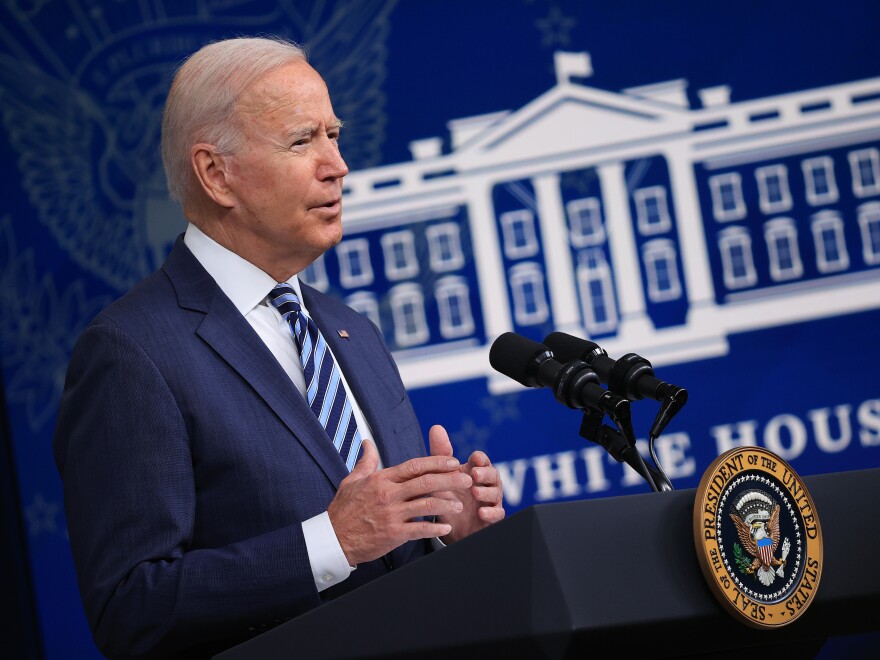Updated September 10, 2021 at 4:19 AM ET
President Biden held a phone call with Chinese leader Xi Jinping on Thursday, only their second since Biden took office, in an attempt initiated by the U.S. to stabilize the bilateral relationship and coax Beijing into more substantive engagement amid deepening competition.
The world's two largest economies have been locked in a standoff fueled by festering disagreements on issues including trade, technology and human rights. That — and a global coronavirus pandemic blocking most international travel — has diminished communication and cooperation between Washington and Beijing.
The White House said in a statement that Biden and Xi "had a broad, strategic discussion in which they discussed areas where our interests converge, and areas where our interests, values, and perspectives diverge."
"They agreed to engage on both sets of issues openly and straightforwardly," the White House said.
China's readout largely mirrored the United States', striking a more conciliatory, hopeful tone than previous state rhetoric has done in the past year and ended with a pledge to keep up "in-depth communication between the leaders of China and the U.S."
"The world's destiny depends on whether China and the U.S. can manage their relations well," it said. "Bilateral cooperation would benefit the world; confrontation would bring disasters. The U.S.-China relationship is not a multiple-answer question of whether we should have good relations, but a compulsory question of how."
The Biden administration has said the U.S. welcomes competition with China but wants to cooperate in areas of common interest, like climate change. Chinese officials say it is unrealistic for the U.S. to expect cooperation while also taking steps that Beijing sees as harming China's interests.
The White House statement said the two leaders "discussed the responsibility of both nations to ensure competition does not veer into conflict."
The call comes as Biden's approval ratings at home sag, in part because of the way he has handled the U.S. exit from Afghanistan. But with the withdrawal now complete, the president is turning his attention back to the U.S. relationship with China, which he has called his top foreign policy priority.
At the end of August, Biden highlighted his priorities in a speech about the U.S. departure from Afghanistan.
"We're engaged in a serious competition with China. We're dealing with the challenges on multiple fronts with Russia. We're confronted with cyberattacks and nuclear proliferation," he said.
"And there's nothing China or Russia would rather have, would want more in this competition than the United States to be bogged down another decade in Afghanistan."
Biden and Xi are both expected to take part in the Group of 20 meeting in Rome next month, although there has been speculation that Xi might not attend in person. Chinese and U.S. leaders have traditionally held a bilateral summit on the sidelines of the meeting, but it's unclear if that will happen this year.
A senior Biden administration official said the idea for Thursday's call was born of frustration with a perceived unwillingness on the part of lower-level Chinese officials to "engage in serious or substantive conversations."
The official said Biden initiated the call with Xi "to really have a broad and strategic discussion about how to manage the competition between the United States and China."
"It's quite likely that engagement at the leader level is really what's needed to move the ball forward," the official said.
Earlier this year, in March, when senior officials from both the U.S. and China met at a halfway point in Alaska, the discussion quickly turned hostile. Yang Jiechi, China's top diplomat, delivered a rancorous speech lambasting the U.S. for abusing "so-called notions of national security to obstruct normal trade exchanges, and incite some countries to attack China" and accused the U.S. of "slaughtering" Black Americans.
It was unclear going into this week's call how receptive Xi would be. In an official statement following Friday's call, Beijing said Xi had called for the "political courage to push Sino-U.S. relations back onto the right track of stable development as soon as possible."
Xi has amassed more power than any Chinese leader since Mao Zedong and is poised for a rare third term as Communist Party boss next year and president in 2023.
Because Xi holds so much power and does not have to "perform for anyone above him," the senior administration official said, the call would be a test of the proposition that he may have more room to maneuver.
Copyright 2023 NPR. To see more, visit https://www.npr.org.




